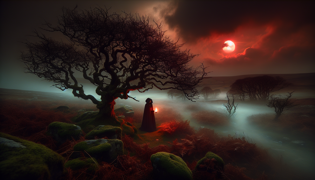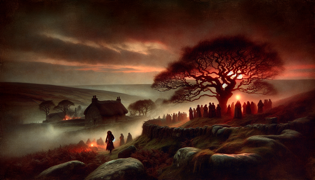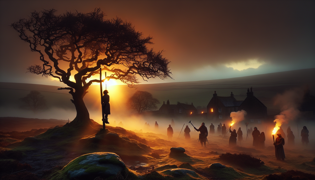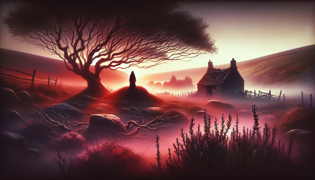The Witch of Barz Hill
Reading Time: 11 min

About Story: The Witch of Barz Hill is a Legend Stories from united-kingdom set in the Medieval Stories. This Descriptive Stories tale explores themes of Good vs. Evil Stories and is suitable for Adults Stories. It offers Cultural Stories insights. Shadows over the Moor.
Introduction
Dusk crept over Barz Hill like ink spilled across parchment. Faded heather shivered in a cold breeze, and distant church bells tolled a mournful note as villagers hurried home. In their hurried footsteps echoed suspicion: their glances flicked toward the silhouette of Maris Pennell, half-hidden by bracken and gorse. Since her husband’s sudden death, Maris had kept to herself, her grey eyes deep as storm clouds, her voice seldom raised above a whisper. Locals whispered she brewed curses in her clay-hewn cottage at the hill’s summit. They said the taproots of her garden pulsed with unnatural sap, as if the earth itself recoiled from her touch. A tang of damp moss and decaying leaves clung to the air, stirring an unease that wound its way into every heart. Even the old miller, whose grizzled hands had turned grain for half a century, admitted his wheel groaned like a wounded beast whenever Maris crossed its path.
At twilight the moor exhaled a breath so cold it stung cheeks like nettle, and torches were lit in hastily barred windows. "She’s not playing with a full deck," muttered one mother to another, wrapping her shawl tight. "Best keep your hair on," warned the blacksmith’s wife as she looked toward the lone outline of her neighbour’s home. Their fears grew as day gave way to night’s unnatural hush, a silence pregnant with promise of calamity. What began as hushed rumours soon swelled into cries of malice. By lantern light, the villagers convened in the rough-hewn inn, their faces gaunt under the flicker of oiled wicks. A single goblet tumbled from splintered tables when a child screamed at the sight of Maris drifting ghostlike past the inn window, her cloak trailing behind her like a dark comet across the sky. That was the moment the spark of paranoia leapt into full-blown terror.
Whispers Amongst the Heather
The first rumours rose like smoke from a peat fire in the dead of night. Children claimed to glimpse a white-robed figure drifting between stones on the hilltop—eyes glowing like ember in the gloom. The chantry’s caretaker, Mr Bourne, swore he heard low chanting drifting across the moor with the stink of brimstone clinging to it. A chill scent of burnt rosemary teased at the nostrils, and the crunch of dead leaves underfoot echoed like skeleton bones. One evening, Mrs Firth’s prized lambs were discovered stiff and gasping beneath her hedge, their fleeces black as char. "That’s the work of the devil’s kitchen," she said with a tremor in her voice. "She’s got spells up her sleeve," echoed the blacksmith, banging a fist on the tavern’s oak beam so hard it groaned.

Maris herself bore the weight of these accusations with a stoicism as hardened as iron. While children taunted her on the lane, tossing handfuls of mud, she only nodded, the mud speckling her skirts like dark daisies. At sunrise she fetched water from the well, the rough rope scraping her palms raw. The clang of metal on stone rang from the smithy, carrying a resonance so bitter it settled in her bones. Villagers locked their doors at midday, refusing her passage, as though her shadow might poison their hearth. Yet she tended her little herb garden with a dedication that shone like moonlight on pitch, her fingers tracing runes over rosemary and rue. Neighbours who once sought her salves and poultices now whispered behind their hands, their eyes darting like startled birds.
When the red cow calved with two heads, its second eye unblinking and cold, flame of suspicion leapt skyward. The parson declared the doubling of life unnatural, proof that Barz Hill’s witch had woven a blasphemous tapestry before the Almighty. "Send for the magistrate," cried one villager, voice shaking like a ship’s cord in high wind. At the edge of the green, torches flickered in a circle around Maris’s cottage. She stood at the threshold, her shawl trailing like a dark banner, hands folded across her chest. The acrid smoke of burning pitch stung her throat as villagers poured in, torches turning her face into a half-remembered spectre of dread. Husbands leaned on pikes, wives clutched kettles and candlesticks like talismans, and in their eyes danced the twin flames of fear and righteousness.
Through a haze of sparks and curses, the local reeve stepped forward and read the charges: witchcraft, devil worship, consorting with demons in the silvered hollows of the night. Maris spoke only two words in her defence—"I’m innocent"—but they tumbled from her lips so softly they were nearly swallowed by the crackling of kindling. A hush fell that seemed to choke even the night air, broken only by the rasp of straw as chairs were hastily dragged back. It was then that the wind found a path into the circle, snuffing out half the torches in a breath so warm it sent a shudder through assembled souls. A straw doll—pin-pricked and ragged—danced across the green as if guided by invisible strings, its hollow eyes staring into every onlooker’s guilt-ridden heart. The scene glowed with a hellish brilliance, red as blood spilt at an altar, etching terror deeper than any brand-iron scar.
Above it all, Maris remained unnervingly calm. Her grey eyes met each glare until some of them wilted under her steady gaze. Yet no mercy came that night. The villagers carried her down from the hill, her skirts brushing bracken sodden with dew, leaving behind a wreath of silence that clung to the air like cobwebs. A single raven croaked overhead, sounding like a crooked laugh in the moonlight.
Flames and Fear
They bound Maris’s wrists with coarse rope so thick it cut into her skin like wire. Each knot tightened a memory: the taste of dandelion tea she coaxed from her garden, the hush of dawn on dew-drenched heather, the soft brush of her late husband’s woollen coat. Silence fell as the magistrate lit his candle—its flame trembling as though reluctant to bear witness. The smell of sweat mingled with peat dust, and a distant owl trilled a lament, dragging sorrow across the empty barns. "Let her speak!" someone shouted, but their voice cracked under guilt’s weight. They had come thirsty for justice, yet found only a bitter draught that left their mouths parched with remorse.

A wooden platform stood ready near the gallows beyond the village green. Maris was led toward it, each step sending pebbles skittering like startled minnows across the path. In every face that glimmered in the torchlight she saw recognition of a fear she knew too well: fear of the dark, fear of the unknown, fear of the self. She raised her head, the frigid moor wind combing through her tangled hair, a sudden hush sweeping the crowd as though a curtain had fallen. The magistrate, robed in black, recited her sentence: banishment by fire, body to the flames, soul consigned to Hell’s darkest pit.
The first torch was brandished by the miller, his arms trembling with righteous hate. Its flame licked upward, casting long shadows that danced on the rough-hewn shards of wood. Maris’s shawl caught fire, flames crackling like shrill laughter, colours twisting from grey to crimson. She stepped forward willingly, eyes fixed on the uncurtained sky, where stars glittered like scattered salt across a dark table. An iron taste of smoke filled her mouth; the heat seared her throat, blooming across her chest as though a living thing. Pain rose within her like a coiling serpent, scales glittering with each heartbeat.
Between the crackle of embers, villagers gasped, tears breaking free like grudging confessions. Old Hutchinson vomited behind a hogshead, mumbling prayers for forgiveness. A mother, clutching a threadbare shawl, turned away in horror as her child whimpered, clutching at her skirts. The blacksmith’s hammer lay forgotten at his feet; even his hands, which had shaped cold steel into swords, could not hold back a sob. "Bob’s your uncle," muttered a drunk, though his jest fell as flat as yesterday’s ale. The only sound was the pop and hiss of flame consuming skin and cloth in a guttural hymn to cruelty.
When the fire burned low, the magistrate declared the deed done. He spat on the ash and kicked it loose, sending embers skittering across damp soil. A handful of villagers stamped on the coals until only grey dust remained. Some returned to their hovels, eyes haunted by flickering memories. Others lingered, staring at the spot where Maris vanished from this world—her name spoken now with shame rather than scorn. In the hush that followed, the wind that swept down Barz Hill felt empty, hollowed by the loss of a soul once feared and now mourned.
Echoes of the Accused
After the pyre burned to embers, a strange quiet took root among the ruined hearths of the village. Windows remained shuttered, and children no longer scampered across the green. Those who dared venture outside found the moor silent save for the mournful hiss of a dying fire and the distant drip of water from the tavern’s eaves. Maris’s cottage, once neat with windows flung open to let in dawn’s warmth, lay empty and charred. Its blackened beams stretched skyward like arms begging forgiveness from the heavens.

In the days that followed, hardship spread like a plague. Cows failed to give milk, grain withered in the fields, and the river Thames—though miles away—seemed to run muddy in omen. The old miller’s wheel refused to turn, creaking like the door of a forgotten crypt. The smith’s horses became balky, their flanks patchy with sores no salve could soothe. A shiver, colder than any winter blast, ran through every house on Barz Hill.
One morning, a traveller arrived with a tale that sent a new wave of dread through the settlement. He spoke of a raven as large as a man, perched atop the gallows beams, its eyes glowing with uncanny intelligence. At midnight it spoke a single word in a voice that cracked like ice: “Innocent.” The story passed through every cottage like wildfire, igniting guilt as sharp as flint. Heads bowed low in prayer, mothers crossed themselves till fingers bled, and fathers offered their last mugs of ale as penance.
Then, on a night bathed in silver moonlight, a sudden storm descended. Lightning struck the old hawthorn, splintering its trunk. Rain pounded the earth with such ferocity that windows rattled and thatch threatened to lift from roofs. As thunder rolled across the moor, villagers huddled in panicked clusters, each wondering if Maris’s spirit had returned to claim vengeance. Indeed, around the smouldering remains of her home, local folk swore they heard the faint whisper of her voice carried on the wind: "Seek truth beyond fear." Only the wind answered back, sighing through the blackened beams.
In the year that followed, Barz Hill never fully healed. The moor remained ever damp, the heather pale and brittle. Yet a quiet resolve took root among a few—enough to remember that justice demands more than fear. They tended the ruined garden where Maris once grew her herbs, leaving small tokens of rosemary and rue. And beneath the charred hawthorn, they carved her name as both warning and remembrance: that even in darkness, compassion must not be burned away.
Conclusion
Years passed, and the story of the Witch of Barz Hill became woven into local lore, mutating with each telling. Some claimed Maris became a spectre appearing on moonless nights, guiding lost travellers from treacherous bogs. Others insisted her spirit transformed into that great raven, flying unseen above the moor, a guardian born of injustice. On stormy evenings, when thunder rattles the shutters and howling wind rattles every hinge, older folk still mention her name in hushed tones over peat fires. They say the air tastes of ashes and rue, and a sorrowful chant drifts on the wind, warning those who would hastily condemn another.
The villagers learned at last that fear is a double-edged blade, cutting both the condemned and the condemner. Though Barz Hill’s heather never returned to its former purple glory, the people planted rosemary hedges around their homes, a silent pledge to weigh compassion above suspicion. The church bells resumed their steady calls, and the miller’s wheel turned once more at dawn, its creak now a softer sound of endurance. But beneath the earth of that windswept hill, past the brittle stones and tangled bracken, lies a lesson carved not in wood or stone but in the echoes of voices long silenced: that mercy must be swifter than accusation, and that no flame, however small, should ever be fanned by the wind of fear again.

















